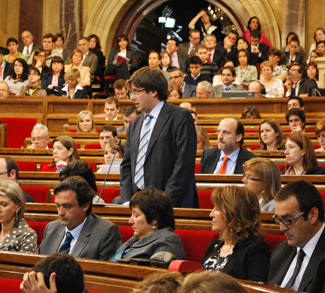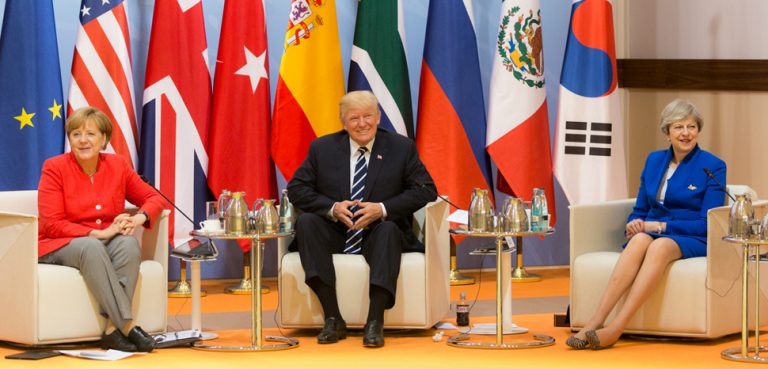The Catalonian independence push, to be understood, addressed and hopefully solved peacefully, needs to be seen beyond constitutional legalities in the context of what sovereignty and self-determination mean for societies.
The right of political self-determination is fundamental for any organized society. Historically and factually, this right is the ultimate basis of most existing sovereign states (unless of course a state claims conquest as its raison d’être). Neither history nor social evolution have finished and, therefore, this right still exists, as act or potency. While self-determination may be limited or wholly unacceptable within a certain constitutional arrangement, it cannot be ignored based on today’s frontiers or much less dismissed in international politics. We do not need to remember the numerous states that have been born in Europe over the last quarter of a century. Despite its bad reputation, nationalism is alive and well, not only in Catalonia but as the engine of any sovereign state, including Spain.
The soundness of the efforts of any society seeking political autonomy from an existing state can only be measured by its social weight; that is, by matters such as population strength, unity of purpose, consistency and relative political strength. In the short term, its legitimacy may be questioned by the constitutional structure where such society sits, but such efforts cannot be dismissed as a social force capable of effecting change. This is just a long way of saying that sovereignty ultimately resides with the people.
Whether or not the historical roots, social comparisons, or ideological grounds argued by a society seeking sovereignty are valid or false is irrelevant. Whether or not Catalonia had its autonomy before in 1714 only to lose it is inconsequential. Ranking the validity of Catalonia’s aspirations with other societies is a useless exercise. Whether or not the Catalonian children are being brainwashed, as some people claim, is also a sterile discussion. The truth about such allegations will not add or lessen the ultimate weight of the social force, whatever that might be. For societies that have sovereign ambitions, such as Catalonia, what finally matters is whether or not they can present a case in a form and substance that is finally accepted in the international order. In this context, a peaceful claim, such as the Catalonian’s, does mean a lot in today’s world, at least among civilized nations.
Rightly so, the duty of any responsible government is to upheld and defend its constitutional order. The Spanish government is formally correct in disputing the Catalonian sovereignty movement viewing the recent independence referendum as illegal. But the responsibility of a mature government goes beyond being just the defender of its state’s existing order and the enforcer of its legal establishment. Unfortunately, this seems to be the narrow position that the Spanish government has taken during this entire dispute. A government is also responsible for ensuring that society can operate harmoniously to fulfill its peoples’ needs. The Spanish government has utterly failed at this higher responsibility. It has completely dismissed all the warnings that Catalonia has been giving for years on its aims for more autonomy and has refused any dialogue that could lead to a challenge of the current constitutional scaffolding.
Beyond errors of substance that the Spanish government has incurred until now, errors of form have made matters worse. The Spanish police has shocked the world using violence against peaceful people performing, at worst, an act of civil disobedience. For whatever it may matter to the Catalonians bent on achieving independence, the recent speech from the Spanish king is a historical textbook on how clumsiness from rulers has precipitated undesired and even catastrophic events through centuries. Showing closed fists and the picture of one of his autocratic ancestors in the back, the king did not bother to utter a single phrase in the Catalan language, a simple gesture that would have not hurt his case. The word ‘dialogue’ was also absent from his speech. The unifying and moderating role that the Spanish constitution (in its article 56, to be precise) demands from the crown was completely missing in his words and manner.
It is quite tempting to dig into the Spanish character to try to shed some light on the reasons behind the strict rigidity that its central government has taken in the case of Catalonia. That characteristic stubbornness (with a not-so-subtle touch of idealism and exaltation of principle) that served well Castile, Aragon, and later Imperial Spain at the height of its glories backfired at the time of the Spanish colonies’ wars of independence and also in 1898 when Spain lost its remaining dominions. It is not hard to sense the same psychological trait in the recent behavior of the Spanish government and of its Bourbon king.
As background noise, although quite effective, a good portion of the Spanish mainstream media has mimicked the government’s position chanting for Spain’s uncompromising unity. The Catalonian independent movement is incoherently being accused of having Nazi, anarchist and leftist roots. The independence referendum has disjointedly been characterized as non-existent, defective and illegal. The proverbial Russian interference has, of course, been flagged as well.
It needs to be emphasized that no constitutional order is frozen. The tragi-comic re-writing of constitutions by South American republics until recent times does not belittle the good reasons for social evolution. In today’s battle of wills between the Spanish government and the majority of Catalonians (majority that today cannot be disputed), only a negotiation leading to effective federalism seems to be the realistic path for reconciliation within a united Spain.
Deaf ears are still prevailing, unfortunately. ‘Facing the Sun’ (Cara al Sol) was the battle-hymn of the pro-Franco hordes during the Spanish Civil War. And ‘Covering it with a Finger’ seems to be, quite sadly, the sequential lyrics that the Spanish establishment has penned with its actions, at least until now.
The opinions, beliefs, and viewpoints expressed by the authors are theirs alone and don’t reflect any official position of Geopoliticalmonitor.com.




